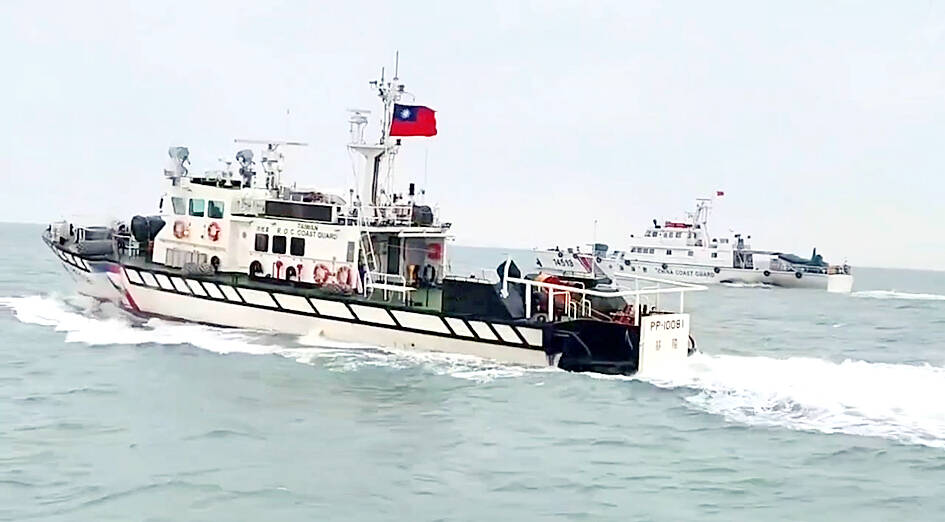Civic groups on Thursday sounded the alarm about a bill proposed by the Chinese Nationalist Party (KMT) stating that the Chinese Civil War has never ended and would redefine the Taiwan Strait as an “internal sea.”
Taiwan Economic Democracy Union convener Lai Chung-chiang (賴中強) said the proposal would alter the political situation between Taiwan and China, and blur territorial boundaries.
“It is clear that the KMT is adhering to the Beijing regime’s assertion that ‘Taiwan is an internal Chinese matter’ by trying to establish a legal framework for it,” Lai said.

Photo courtesy of the Ocean Affairs Council
Eighteen KMT and Taiwan People’s Party lawmakers have signed the bill initiated by KMT Legislator Chen Yeong-kang (陳永康) to amend Article 29 of the Act Governing Relations Between the People of the Taiwan Area and the Mainland Area (台灣地區與大陸地區人民關係條例), Lai said.
The change would transfer jurisdiction of the seas around Kinmen and Lienchiang counties from the Ministry of National Defense to the Ocean Affairs Council.
It would also permit local officials in the counties to negotiate directly with the Chinese government on judicial, commercial and administrative issues, potentially even political, Lai said.
Democratic Progressive Party caucus chief executive Rosalia Wu (吳思瑤) said the amendment would deter international assistance to Taiwan by making the waters internal territory instead of international waters, lending credence to Beijing’s claims that cross-strait issues are a domestic matter.
Chen defended the proposal before a legislative meeting yesterday, saying it would transfer the responsibility of patrolling restricted waters near Kinmen and Lienchiang from the defense ministry to the Coast Guard Administration, an agency of the Ocean Affairs Council.
Restricted waters, territorial waters and sovereignty are three separate issues that must not be mixed up in the discussion of the bill, he said.
Since the lifting of martial law, the outlying islands mainly have to deal with law enforcement issues, which are the responsibility of the coast guard, rather than defense of the nation’s borders, which falls under the defense ministry’s purview, he said.
He added that there are only “internal waters” and “international waters” in international law, and there is no such thing as “internal seas.”
Additional reporting by Hsieh Chun-lin and CNA

A strong continental cold air mass is to bring pollutants to Taiwan from tomorrow, the Ministry of Environment said today, as it issued an “orange” air quality alert for most of the country. All of Taiwan except for Hualien and Taitung counties is to be under an “orange” air quality alert tomorrow, indicating air quality that is unhealthy for sensitive groups. In China, areas from Shandong to Shanghai have been enveloped in haze since Saturday, the ministry said in a news release. Yesterday, hourly concentrations of PM2.5 in these areas ranged from 65 to 160 micrograms per cubic meter (mg/m³), and pollutants were

Taiwan’s armed forces have established response protocols for a wide range of sudden contingencies, including the “Wan Chun Plan” to protect the head of state, the Ministry of Defense (MND) said today. After US President Donald Trump on Saturday launched a series of airstrikes in Venezuela and kidnapped Venezuelan President Nicolas Maduro, concerns have been raised as to whether China would launch a similar “decapitation strike” on Taiwan. The armed forces regularly coordinate with relevant agencies and practice drills to ensure preparedness for a wide range of scenarios, Vice Minister of National Defense Hsu Szu-chien (徐斯儉) told reporters before a

EVA Airways on Saturday said that it had suspended a pilot and opened an investigation after he allegedly lost his temper and punched the first officer several times as their plane was taxiing before takeoff at Los Angeles International Airport. According to a report published on Thursday by The Reporter, the incident occurred after the flight’s Malaysian first officer tried to warn the Taiwanese pilot, surnamed Wen (文), that he was taxiing faster than the speed limit of 30 knots (55.6kph). After alerting the pilot several times without response, the first officer manually applied the brakes in accordance with standard operating

Japanese Councilor Hei Seki (石平) on Wednesday said that he plans to visit Taiwan, saying that would “prove that Taiwan is an independent country and does not belong to China.” Seki, a member of the Japan Innovation Party, was born in Chengdu in China’s Sichuan Province and became a naturalized Japanese in 2007. He was elected to the House of Concilors last year. His views on the Chinese Communist Party (CCP) — espoused in a series of books on politics and history — prompted Beijing to sanction him, including barring Seki from traveling to China. Seki wrote on X that he intends